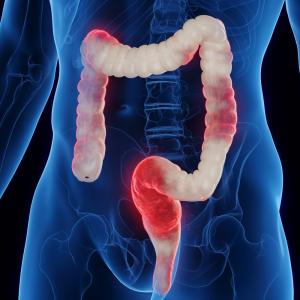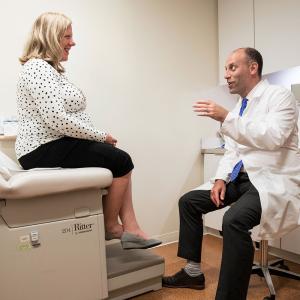
P’ng Loke, PhD, and Ken Cadwell, PhD, examine bacterial plates in the Cadwell lab at NYU Langone’s Skirball Institute of Biomolecular Medicine.
Photo: NYU Langone Staff
Nearly 10 years ago, parasitologist P’ng Loke, PhD, then a postdoctoral fellow at the University of California, San Francisco, received a curious phone call. The caller, a technology entrepreneur, told Dr. Loke that he had cured himself of a painfully inflamed colon by eating parasitic whipworm eggs.
Intentionally infecting yourself with parasites may sound like an extreme way to treat intestinal distress, but the idea is not without scientific merit. Epidemiologic studies have shown that people who live in countries where soil-dwelling parasites like whipworm are prevalent tend not to develop inflammatory bowel disease, or IBD, an umbrella term for chronic conditions of the digestive tract. Such disorders, which include both ulcerative colitis and Crohn’s disease, currently affect more than 1.4 million Americans. Cases of IBD are also on the rise in countries such as Japan and Korea, where the number of parasitic intestinal infections have declined in recent years—further supporting the notion that harboring worms might hamper IBD.
Given all that—and the fact that the only other treatment options for this individual were a colectomy or a grueling regimen of immunosuppressive drugs—Dr. Loke says, “Parasitic worms probably didn’t seem so bad.” Intrigued by the patient’s apparent turnaround, Dr. Loke and his colleagues took a closer look at his intestines. Their observations—which were published in 2010, when Dr. Loke had joined the faculty at NYU Langone as associate professor of microbiology—revealed that the worms were boosting intestinal mucus.
But why would a flood of mucus quell the symptoms of IBD? Now a follow-up study in mice—recently published in Science—offers a fascinating clue: gut bacteria. For this latest series of experiments, Dr. Loke joined forces with Ken Cadwell, PhD, associate professor of microbiology. Dr. Cadwell and his colleagues had engineered a mouse model of IBD by mutating a gene called Nod2, which is frequently damaged in people with Crohn’s disease. Like patients with IBD, these mice display a marked withering of mucus-producing cells in the small intestine. Without its protective layer of mucus, the animals’ intestines became overrun with Bacteroides, a family of inflammation-producing bacteria.
When the researchers then infected the animals with the mouse version of whipworm, however, their mucus production was restored and the Bacteroides vanished. That change “completely reversed all the abnormalities we saw in these mice,” says Dr. Cadwell. In other words, the mice experienced the same relief as the self-infected entrepreneur.
But how did the worms beat back the bad bacteria? Indirectly, it seems. According to Drs. Loke and Cadwell, the parasites provoke a particular type of immune response—one that enhances the production of mucus. The mucus, in turn, serves as a source of nutrition for a class of beneficial gut bacteria called Clostridia. As these protective microbes proliferate, they outcompete the Bacteroides, restoring a healthy balance of bacteria to the gut.
At least that’s what happens in mice. But what about in people?
To answer that question, Drs. Loke and Cadwell teamed up with Dr. Yvonne Lim and her colleagues at the University of Malaya in Kuala Lumpur. These researchers had been following a tribe of indigenous Malaysians called the Orang Asli, who live in an environment rife with parasites like whipworm.
As predicted, the Orang Asli—most of whom harbor the parasitic worm—have fewer Bacteroides and more Clostridia than individuals from the urban environment of Kuala Lumpur. When the researchers treated the Orang Asli with a drug that killed off the parasites, the bacterial balance was reversed: the bad bacteria came to outnumber the good, the same situation that prevails in people with IBD.
Worms may not provide a cure for all those suffering from intestinal ailments. But the current study suggests that the parasite could aid a subset of people with IBD or Crohn’s disease—for example, those who have impaired mucus production, an increased load of Bacteroides, or defects in Nod2, the gene mutated in Dr. Cadwell’s mice.
In the meantime, Drs. Cadwell and Loke will continue to explore the mechanism that allows worms to alter the intestinal microbiome. For example, they’ve found that injecting the mice with an immune molecule that’s produced in response to parasitic infection is enough to boost mucus production and drive the growth of good bacteria.
Similarly, providing mice with Clostridia directly can also thwart the growth of bad bacteria, an observation that, Dr. Loke says, “opens the door to probiotics” and could send the investigators back to Malaysia. “We’d like to isolate Clostridia from the Orang Asli to see if the bacteria would act as a more potent probiotic,” he says.
“The premise is very simple,” adds Dr. Cadwell. “People who are resistant to Crohn’s disease are more likely to harbor fewer Bacteroides than Clostridia bacteria.”
Eliminating the parasitic middle man would no doubt be a prescription that’s easier to swallow.

